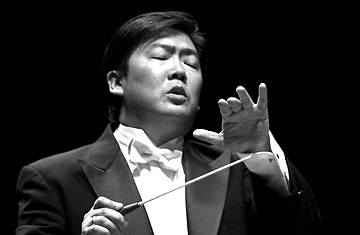
Long Yu
(2 of 2)
The result was a fertile cultural topsoil in which classical music could take hold and grow. When China began allowing students to go abroad in the 1980s, many swarmed to the music capitals of Europe and the U.S. to study in the classical tradition. Long himself left China in 1988 and spent five years at the Hochschule Academy in West Berlin, then several more years in Hong Kong as part of the small classical music community there. In 1990 and 1992 he visited Beijing and was given the opportunity to conduct the Central Philharmonic Government Orchestra — a party-run symphony with a musical reputation as dreary as its name but which represented the best China had. Finally, in 1997, he decided to return to Beijing full-time with the intention of establishing an annual music festival. The first such two-week event occurred the following year, and it's been growing in scope and ambition ever since.
This year's BMF was a wholly global affair, with fourteen corporate sponsors that included such multinational giants as Audi, Credit Suisse, UBS and American Express. Performers came from across Europe and the Americas. Germany alone sent two complete opera companies — a massive mobilization that involved 420 people and 16 trailer-sized shipping containers. The overall program was an eclectic one that included an evening-long tribute to Leonard Bernstein performed by the China Philharmonic, a globally competitive orchestra that pushed aside the government symphony in 2000 and that Long himself was tapped to lead. Just days after the 2008 festival ended, Long traveled to New York City, where the Bernstein performance was shown on eight giant screens in Times Square, just blocks from the spot where Bernstein's West Side Story had its Broadway premiere more than half a century earlier. Next year's BMF is already being planned, and Long is looking at other long-term projects, including a collaboration with Israel and Germany to produce an opera about the small Jewish community in Shanghai that sheltered Holocaust refugees during World War II.
Even as the classical industry in China grows, nobody pretends it's fully mature yet — nor without some problems particular to the country. A billion potential music fans means a billion potential buyers for pirated recordings of the masters, and bootlegged Mahlers and Beethovens are already turning up. Then too, there are Chinese audiences themselves, who still have a little learning to do about the classical ways.
"Some younger people may love Bach, but they couldn't tell you if he's alive or not," says Marc Johnston, president of Align Entertainment and manager of both Long and Lang Lang, the 26-year-old classical pianist who has lately become China's Elvis — only bigger — and who performed at the opening ceremonies of the Beijing Olympics. "Others are still learning the basic protocols, like not applauding between movements."
Still, this very unfamiliarity can sometimes produce a particular kind of thrill. One evening at the Forbidden City Concert Hall this month, American pianist Murray Perahia was performing a selection of classical compositions. He held the audience fast as he moved from Beethoven to Mozart to Bach, but he truly blew the doors off the place when he reached his Chopin. As he left the stage after his last listed piece, some of the audience members — unfamiliar with the tradition of the encore — left the hall. Perahia returned to play some more, and the remaining audience not only applauded, but let out a full-throated, almost primal whoop, one that seemed equal parts surprise, delight and palpable gratitude. Every performer strives to elicit that triptych of feelings. Only the rarest ones — in the rarest places — manage to achieve it.
